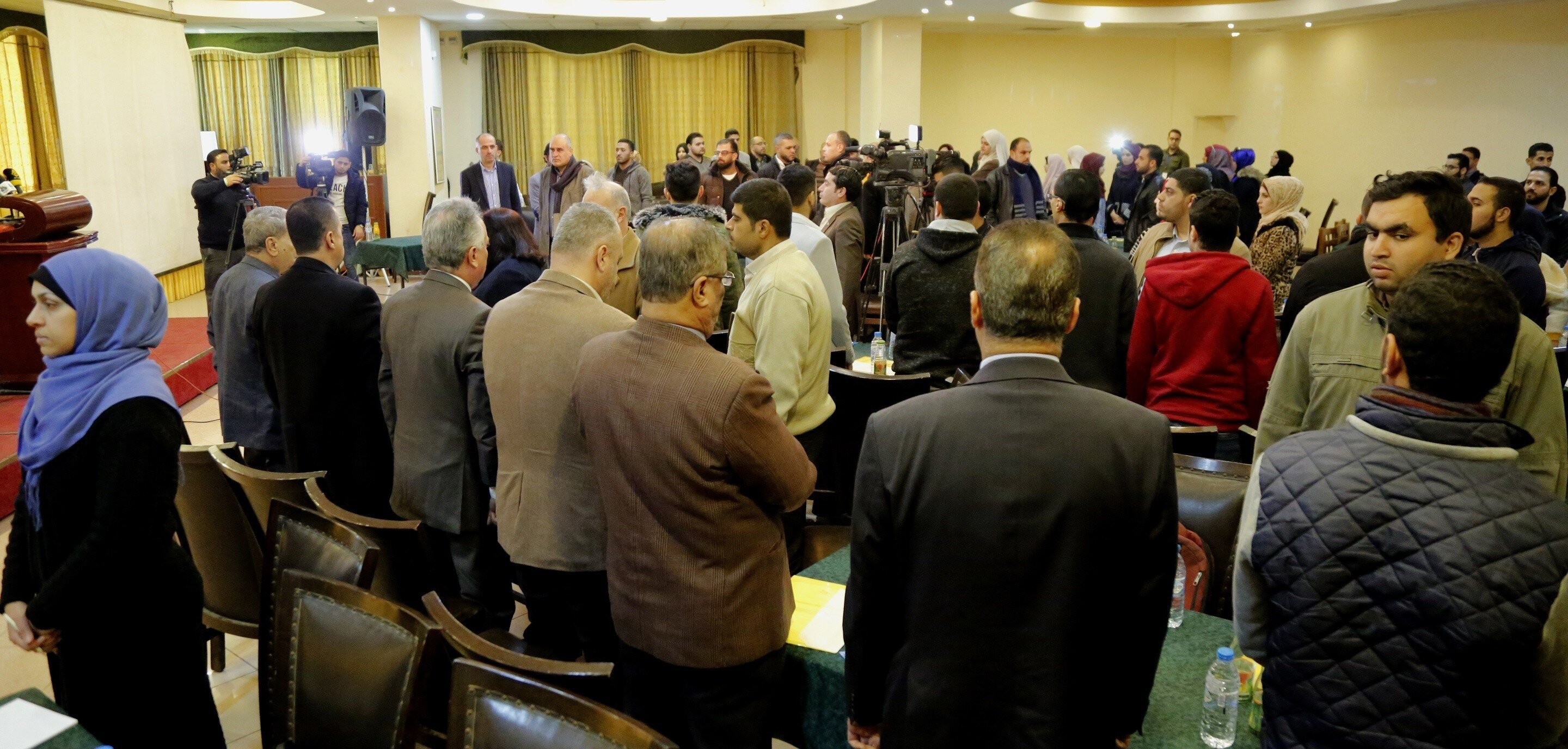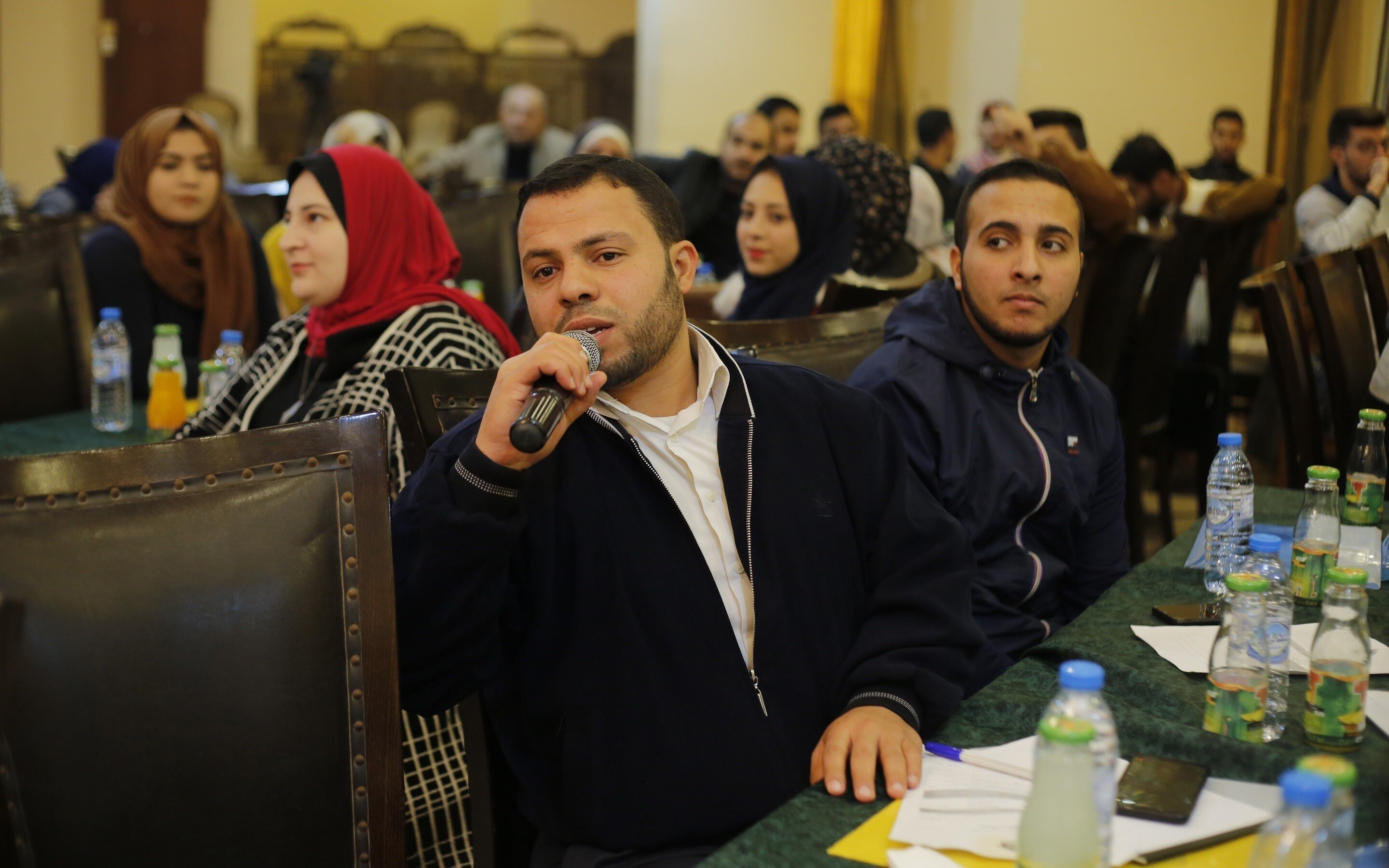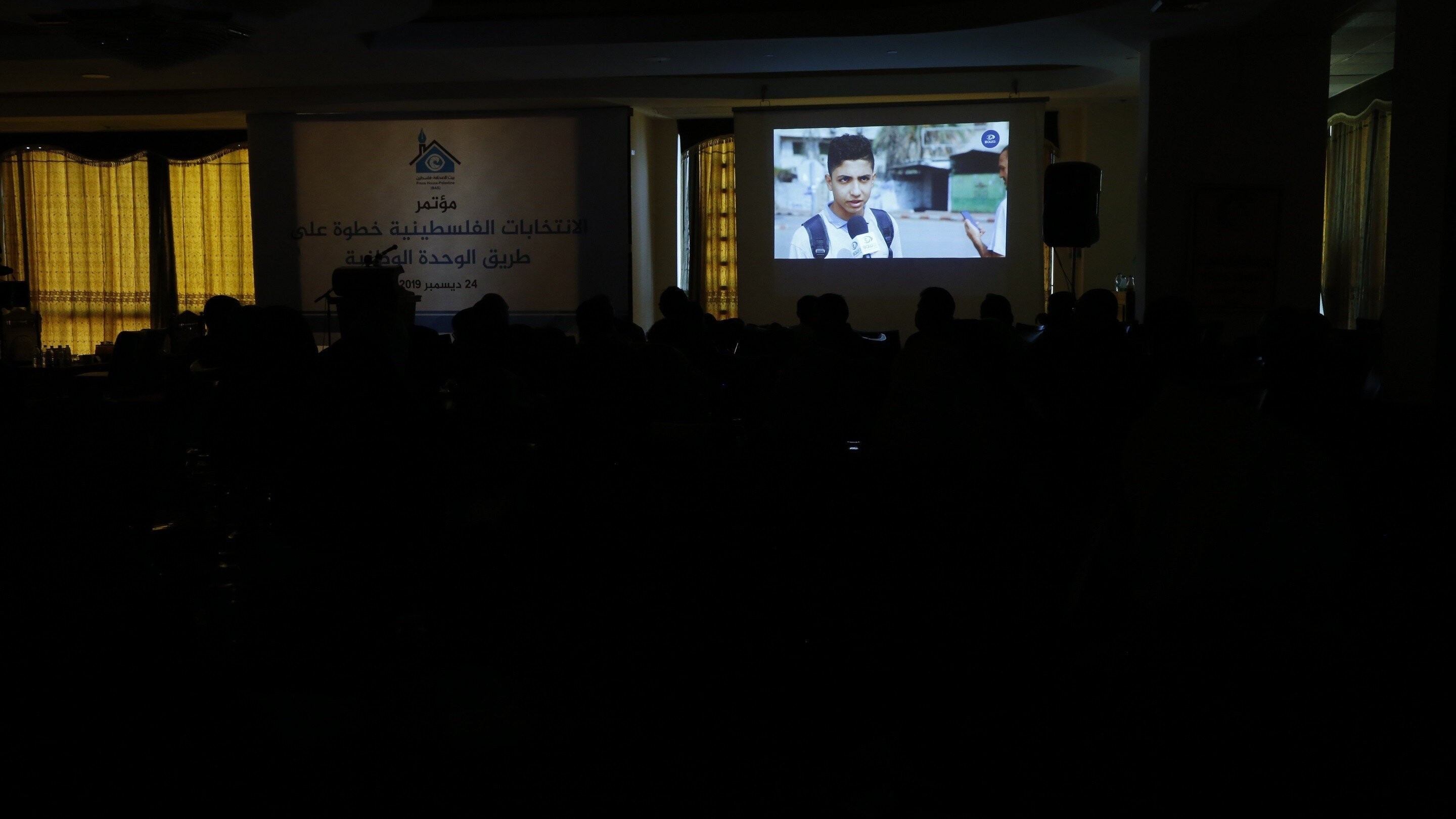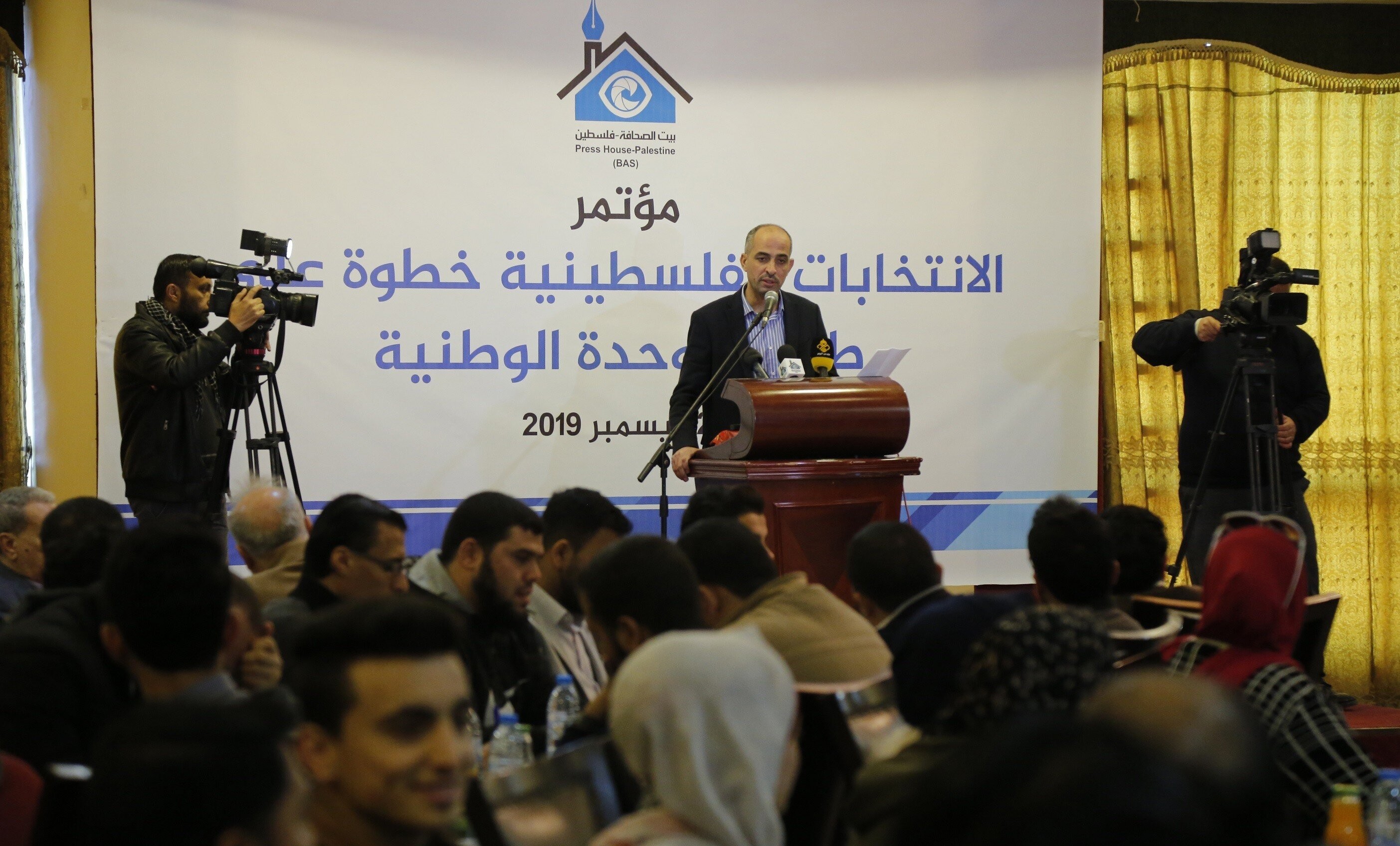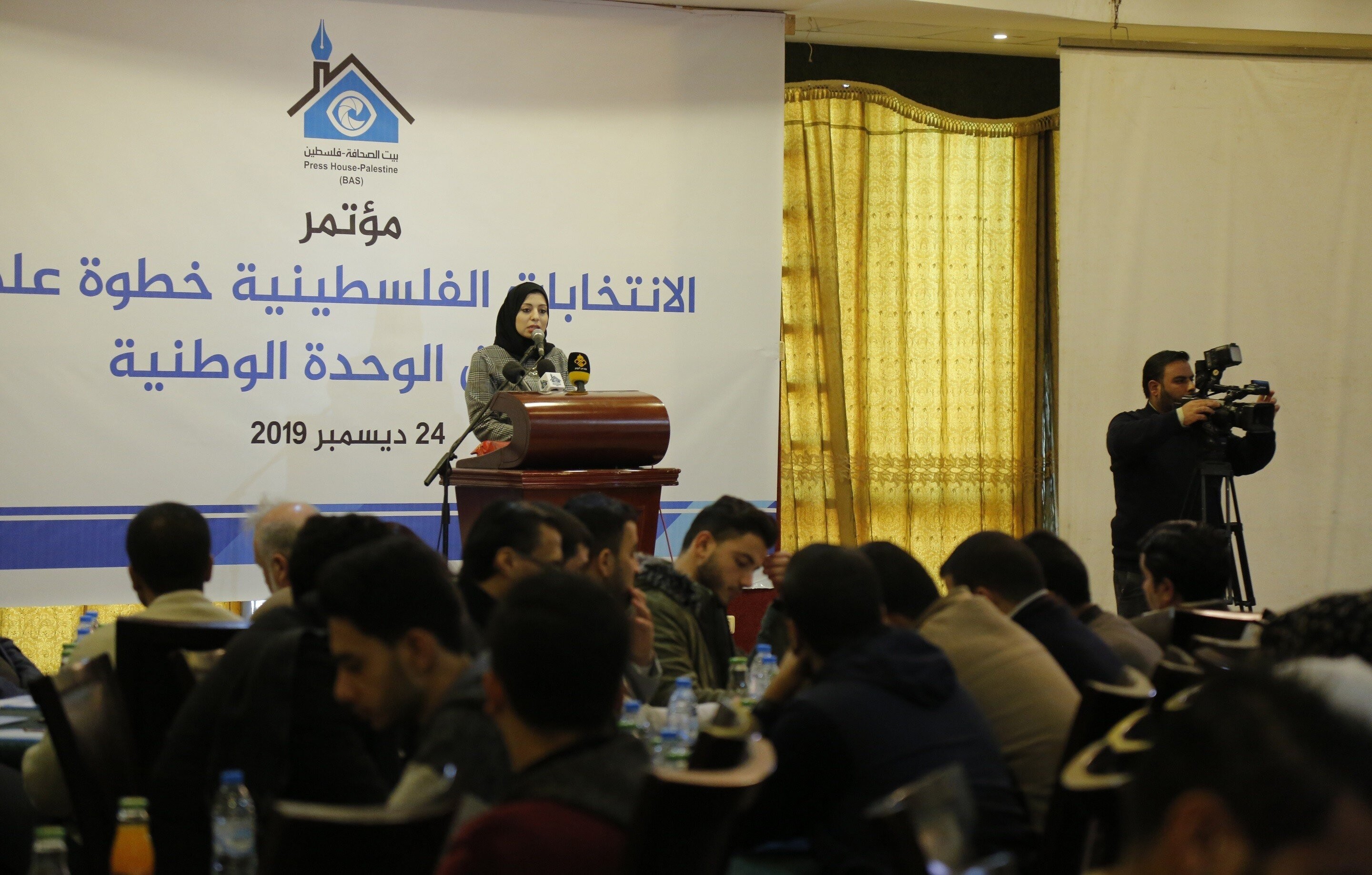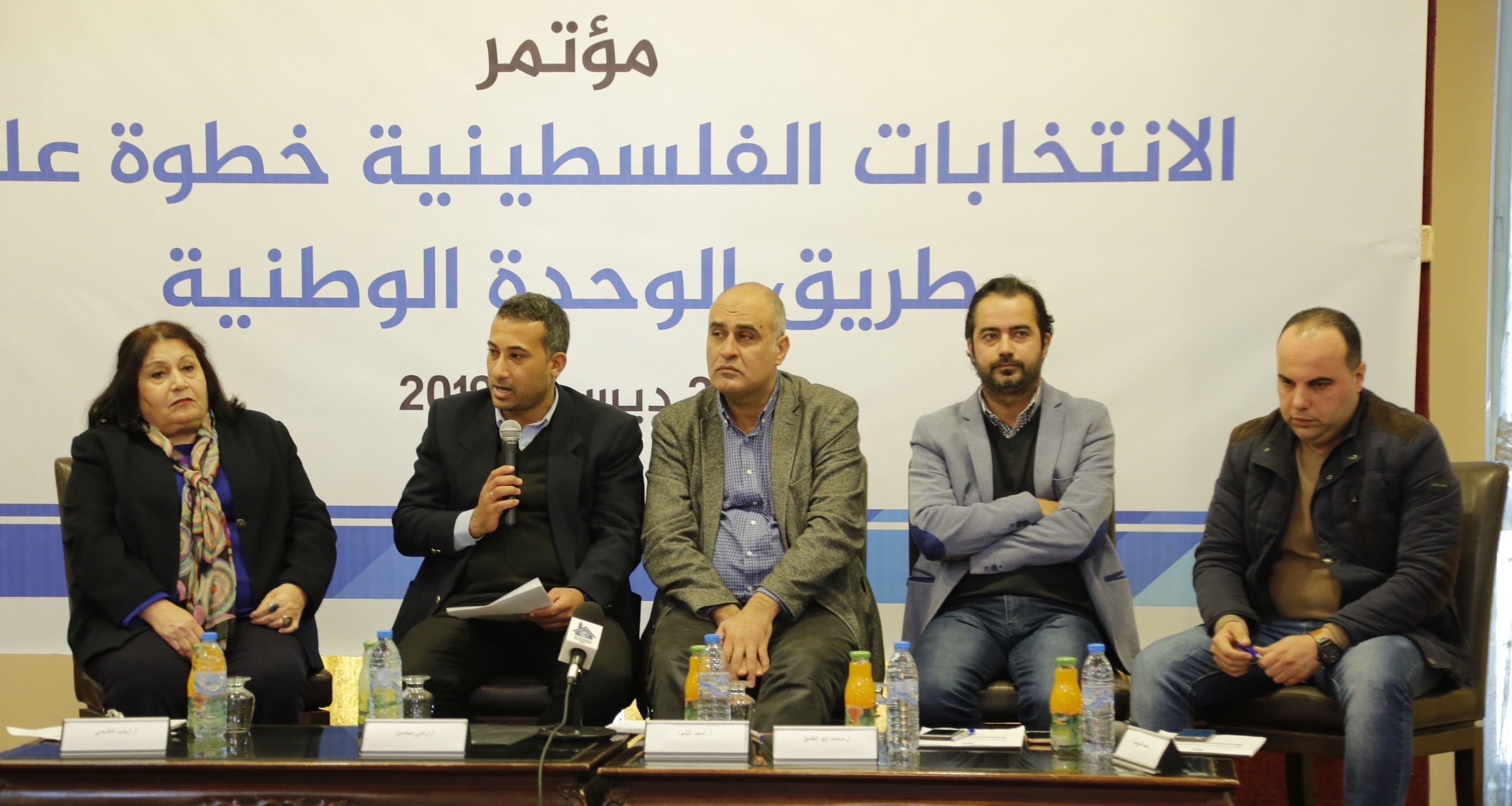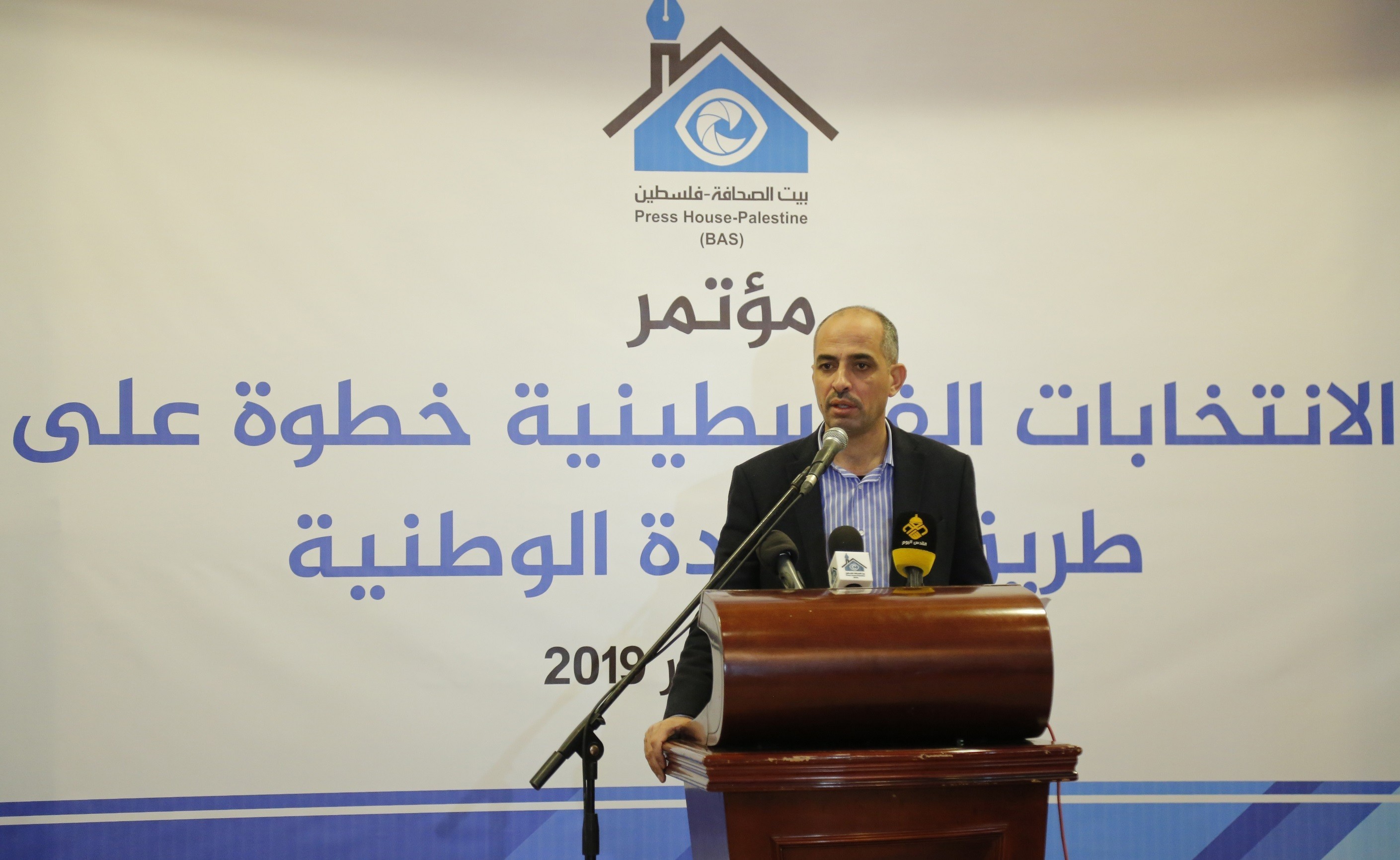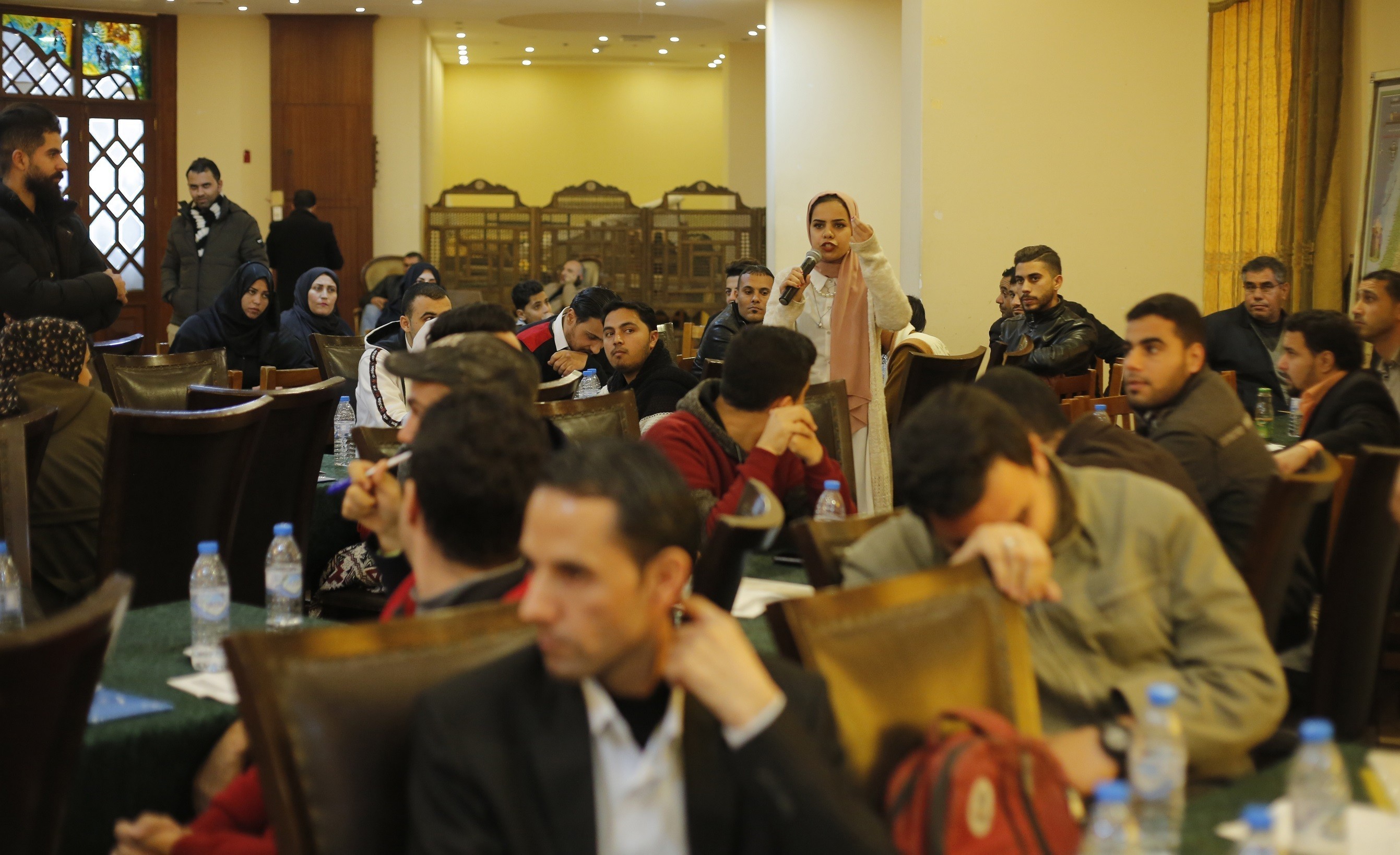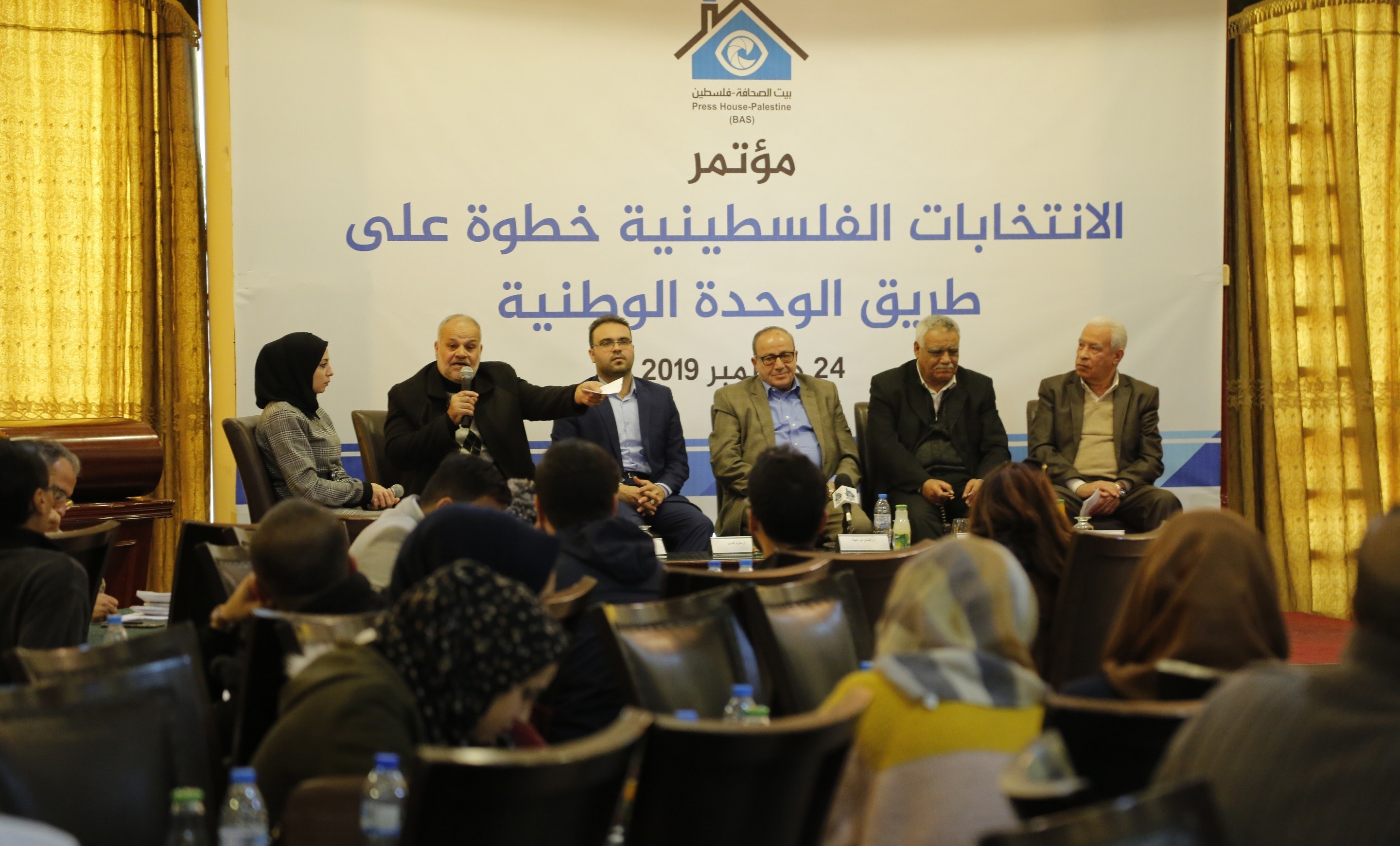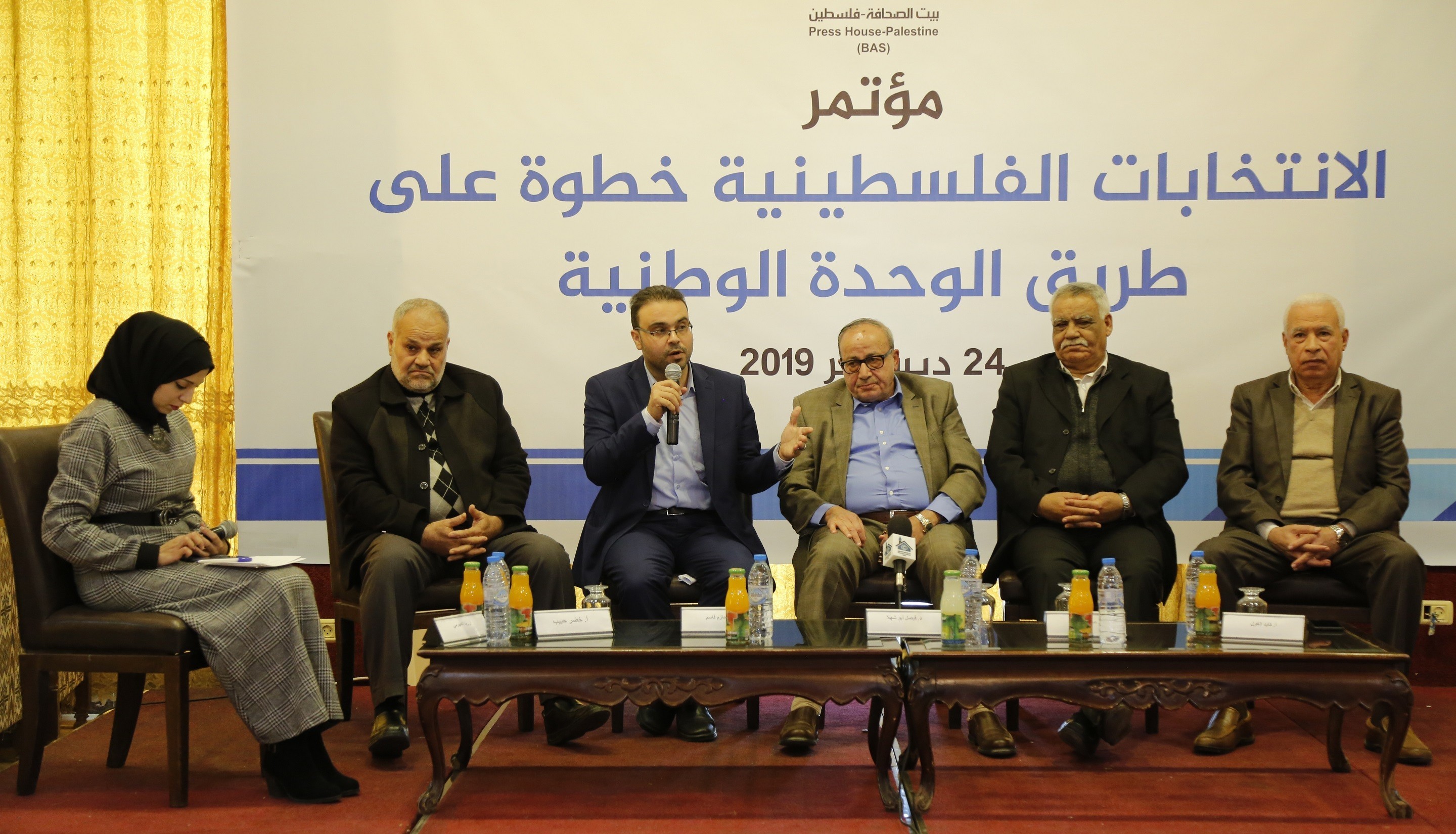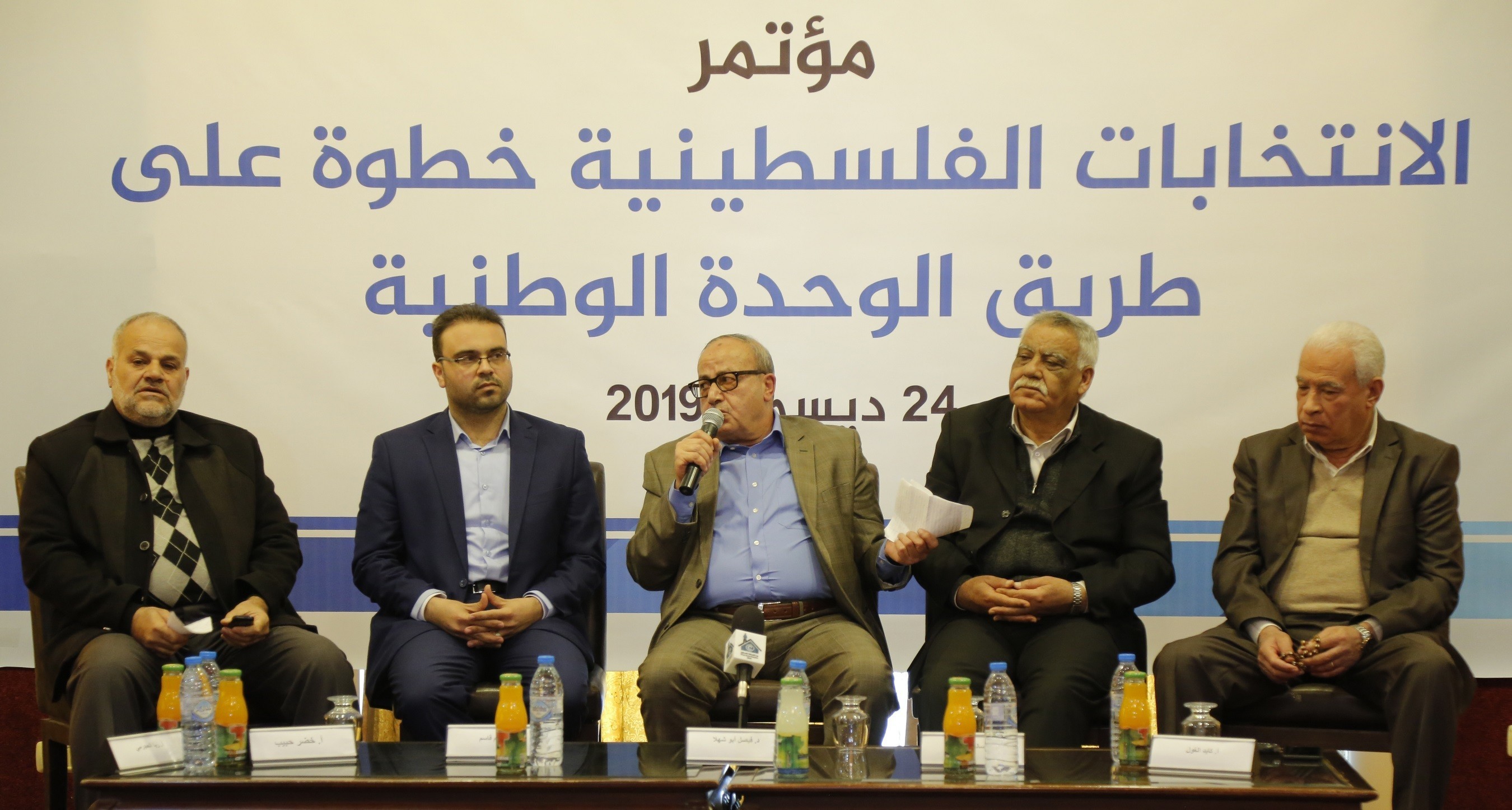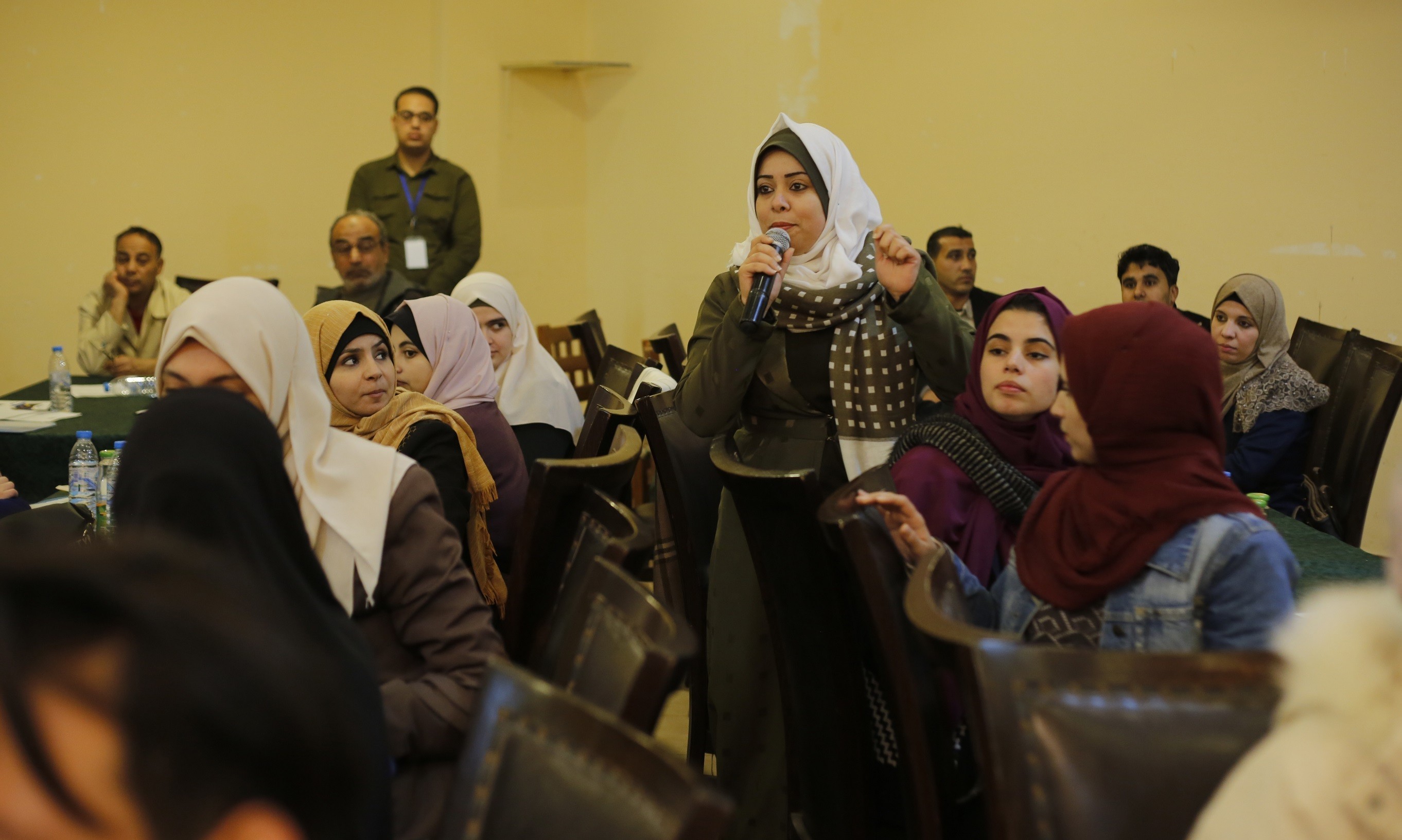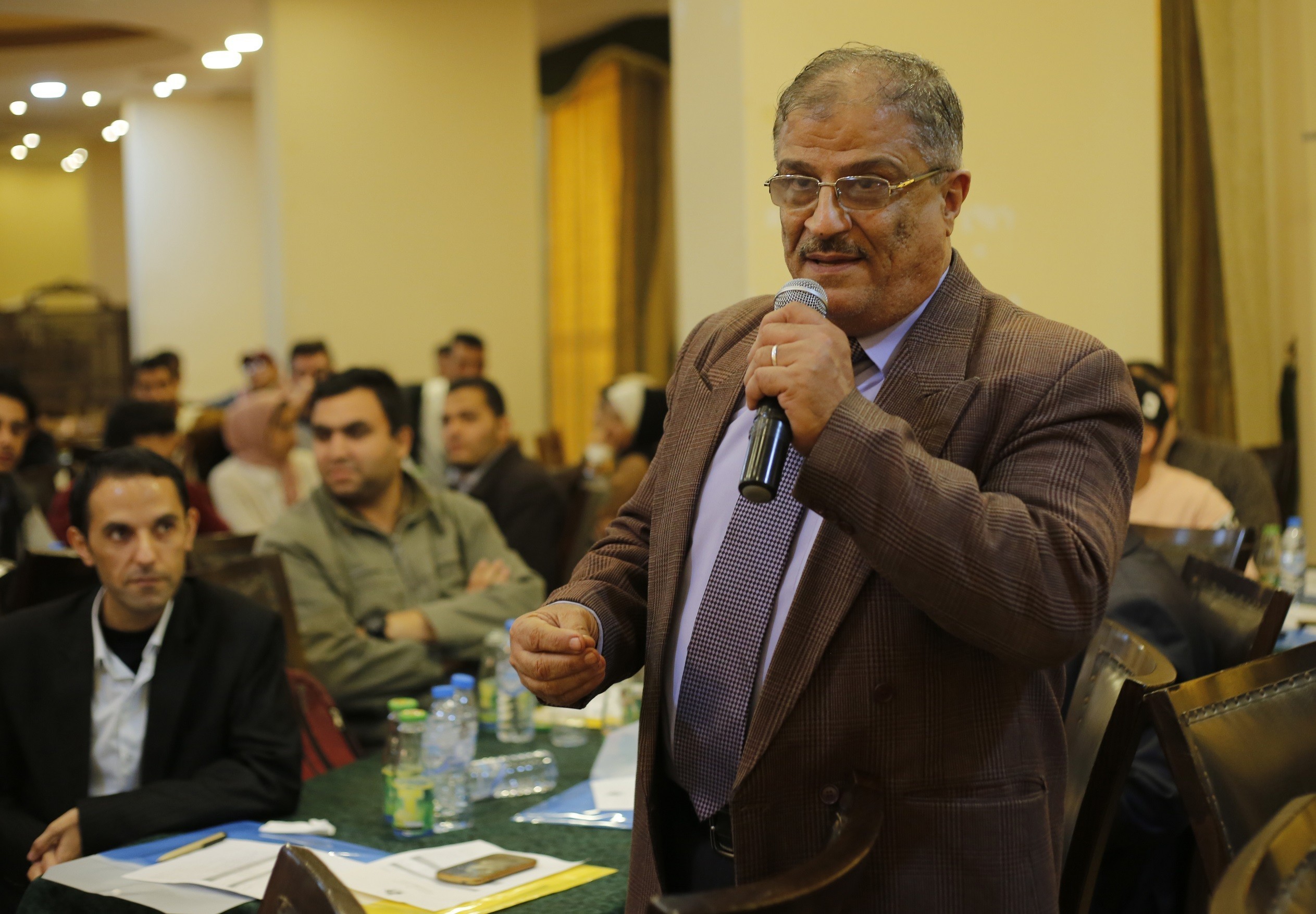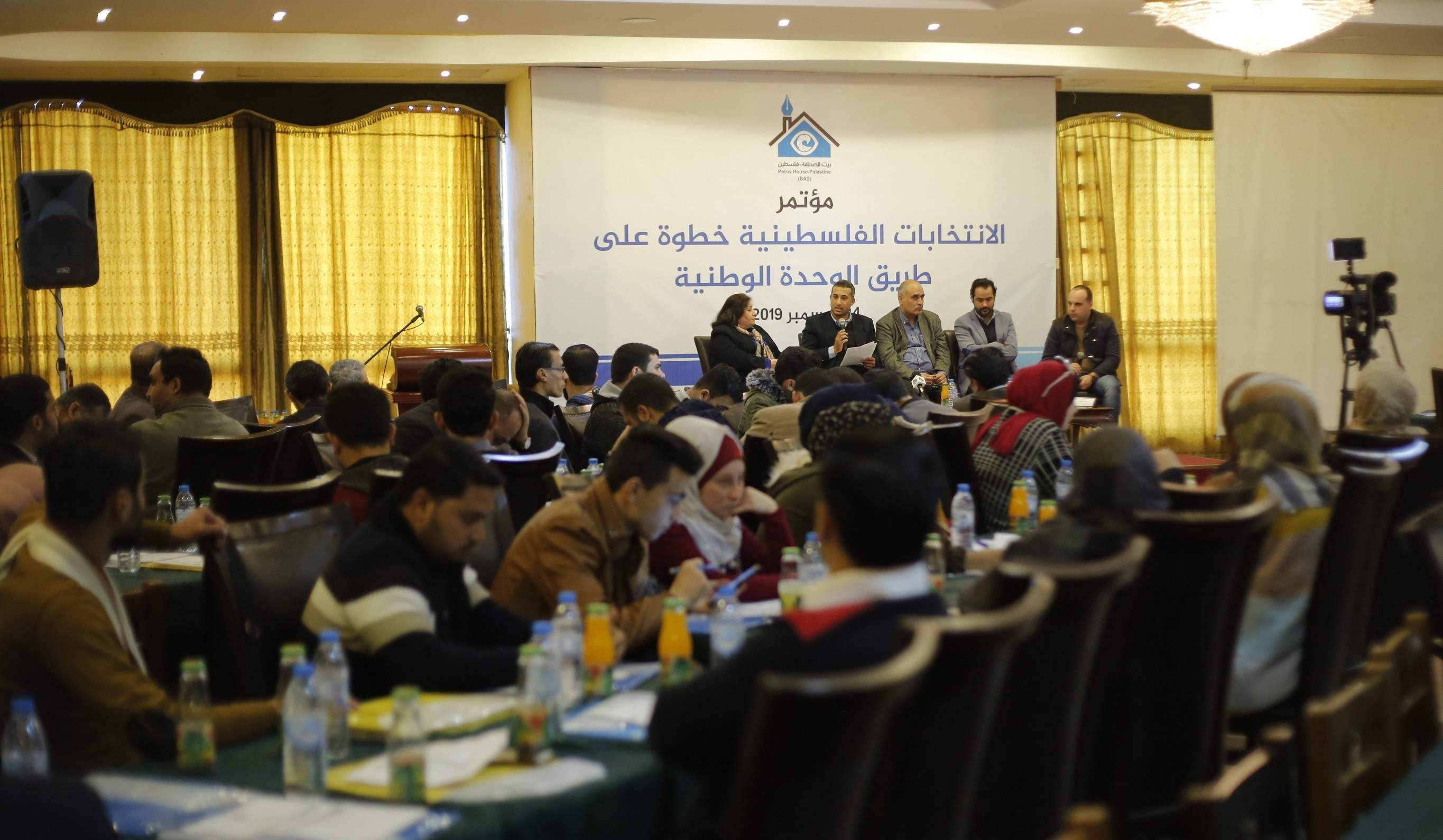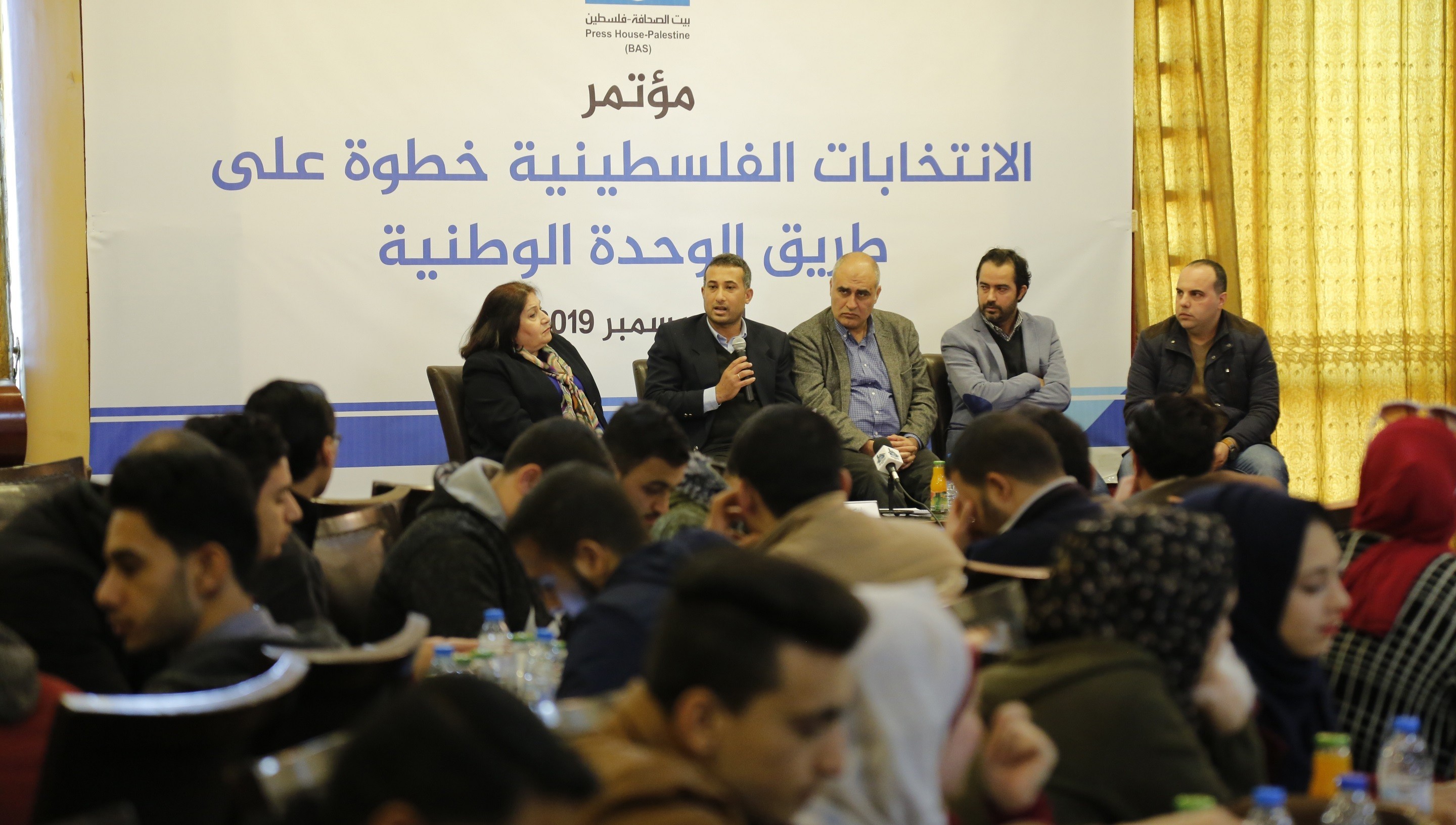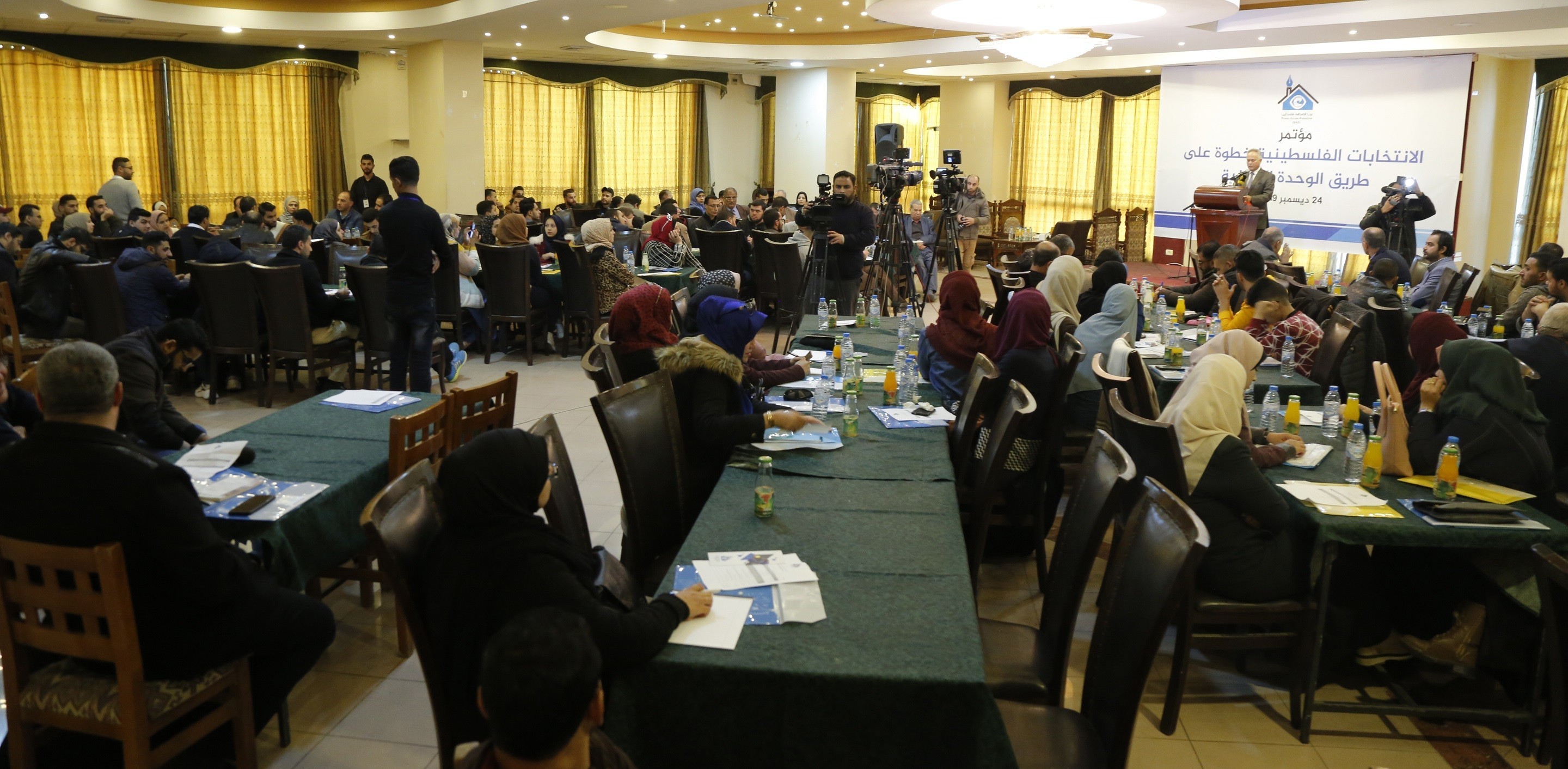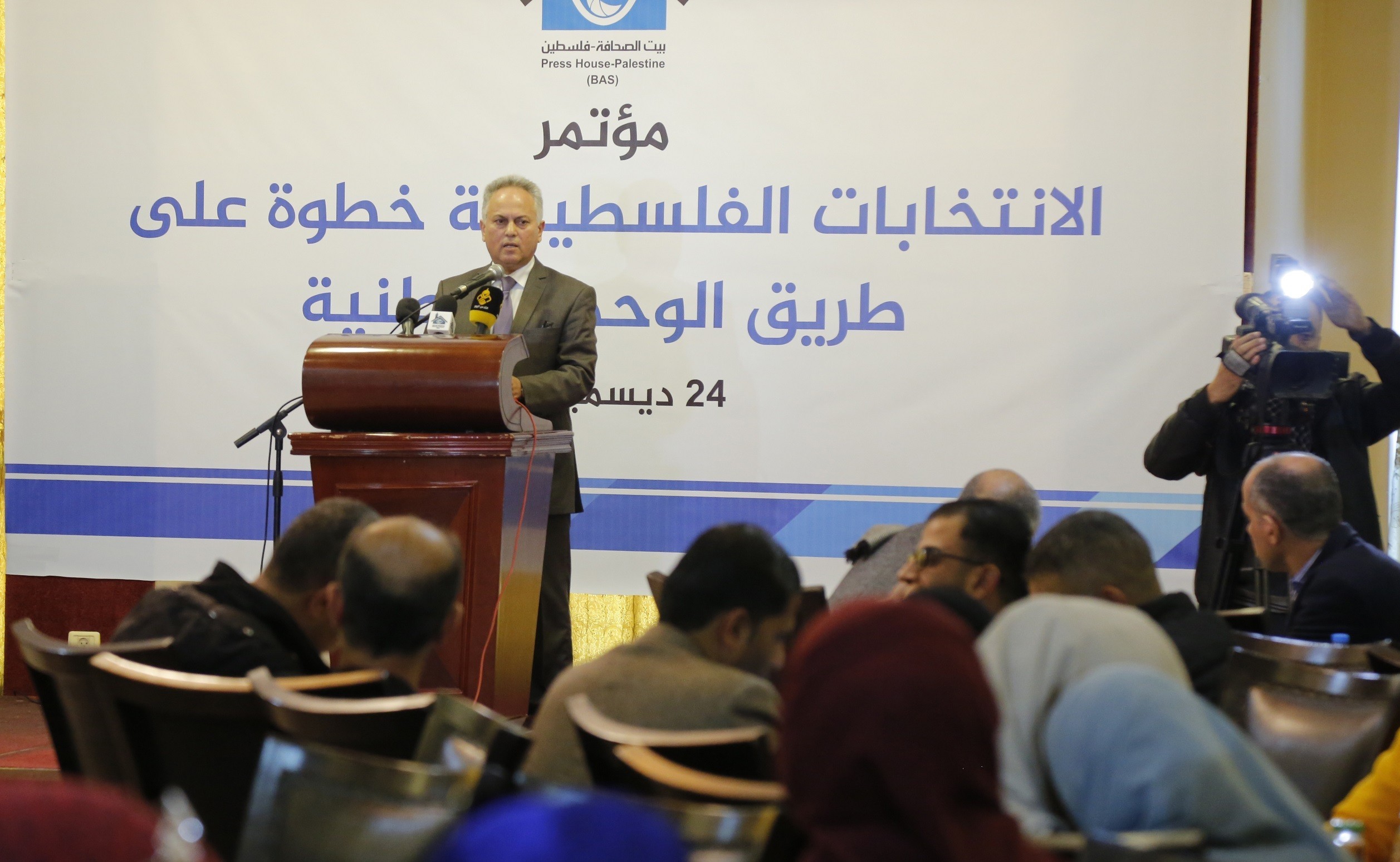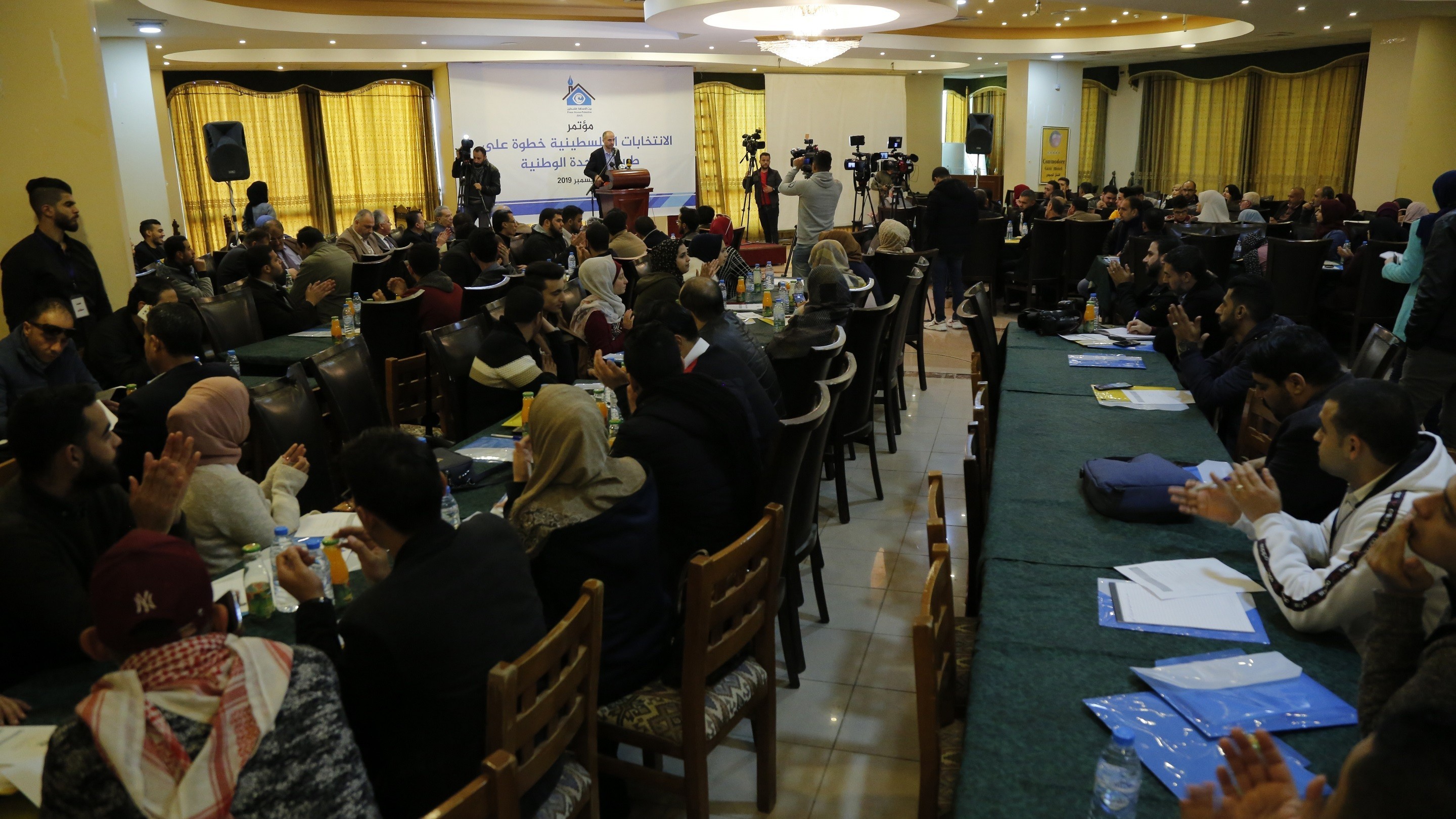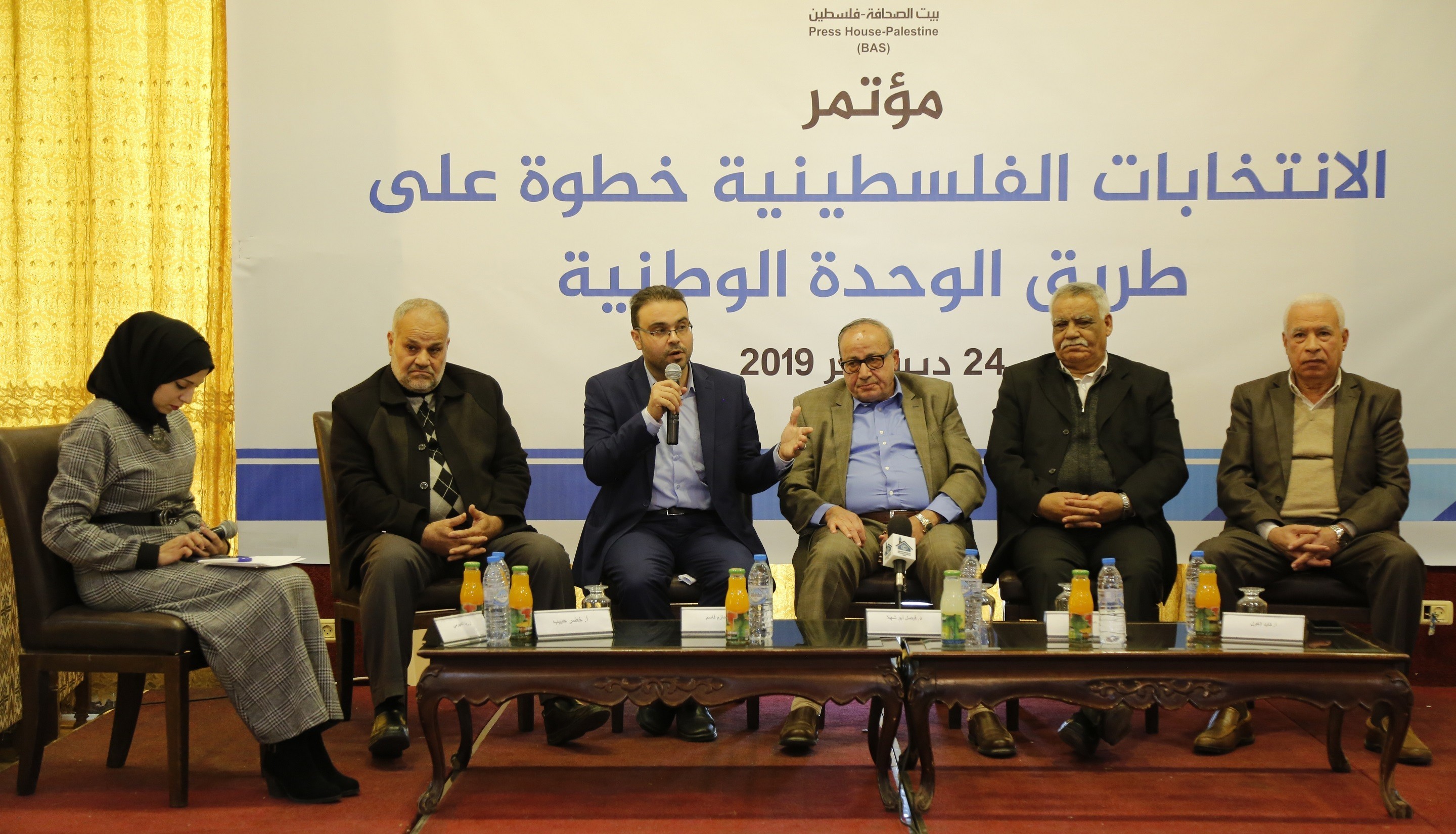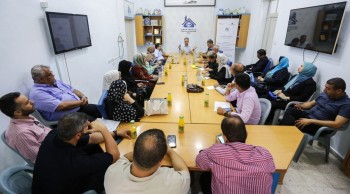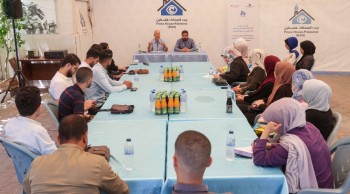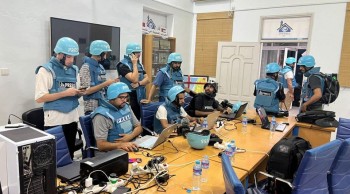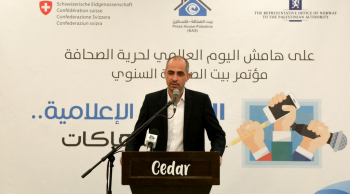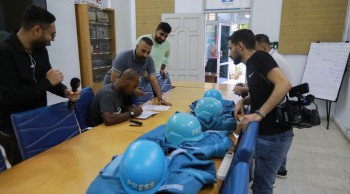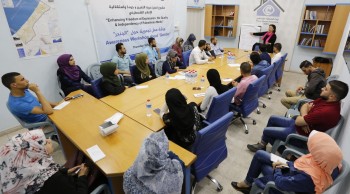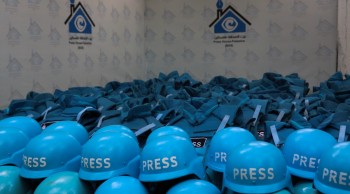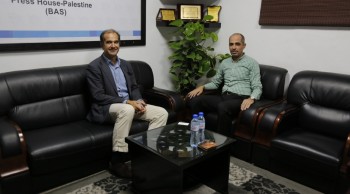On Tuesday, 24th. Dec.2019, the Press House, Palestine held a conference, entitled "Palestinian Elections, a Step on the Path to National Unity", at the Commodore Hotel in Gaza City.
The conference was attended by representatives of the Central Elections Committee, Palestinian factions, civil society organizations, and a group of journalists and college students.
The conference was opened with the national anthem, then the speeches of the Press House and the Election Commission. A video showing a poll of public opinion prepared by Sawa News Agency was presented before the two sessions of the conference started.
In his speech, Bilal Jadallah, the Chairman of the Press House, welcomed the attendees, stressing the endeavor of the Press House to provide an incubator for the independent Palestinian media and the freedom of opinion and expression in the Palestinian territories, by developing the performance of media professionals professionally at their different generations.
He stressed that the Press House seeks to create a network of media professionals, writers, and defenders of media freedom, human rights, democracy, reconciliation, freedom, and women's issues, and to provide a space for dialogue in a way that supports media and societal issues.
He explained that this conference comes within the framework of the Press House and its permanent strategy to work to promote freedom of opinion and expression and support any efforts made to strengthen national unity, noting that he is reviewing one of the most important issues at all levels, and had been long-awaited for many years.
Jadallah emphasized that the elections are a right for all, as they constitute the cornerstone of democracy, which everyone hopes it will be the first step to end the division and achieve national unity and to put an end to this issue.
He pointed to the need to support any positive step in the path to achieve the elections, and provide the necessary support to achieve this goal, pointing out that the role of the media in this matter is important and essential, which requires concerted all media efforts to achieve the goal and provide the appropriate media environment to achieve this and keep away from division and disagreement.
The Chairman of the Press House’s Board of Directors called on all male and female colleagues in the Gaza Strip and the West Bank to work to unify the media efforts and create an atmosphere and a positive climate to achieve this national goal and avoid any contradictions state in this matter.
Jadallah thanked all the attendees, representatives of the factions and civil society organizations, and everyone who participated in the success of this conference.
In turn, Jameel Al-Khaldi, the regional director of the Central Elections Committee in the Gaza Strip, stressed the importance of holding this meeting, thanking the Press House “For the efforts, it is making to build an independent Palestinian media based on the concepts of freedom and democracy and their principles.”
Al-Khalidi stressed the importance of all faction’s consensus to hold the elections, pointing to the need to seize this opportunity and consider it an entry point to end the division and to complete the reconciliation.
He stated that the elections must be in the context of re-consideration of the democratic process, respecting its results, adopting a mechanism for the peaceful transfer of power between all parties, and learning lessons from previous elections without restoring the condition of division.
He said that the committee is capable with the partners to complete the electoral process in a procedural manner determined by the law and that it be real and create an atmosphere and a favorable electoral environment for all that guarantees freedoms and protects the rights.
Al-Khalidi confirmed the commission's readiness for the elections but they are awaiting the issuance of President Mahmoud Abbas's presidential decree, which is related to Israel's approval to hold it in the city of Jerusalem.
Al-Khaldi revealed that the election commission will open registration centers to update the electoral record immediately after the decree is issued, indicating that the registry currently includes 85% of those eligible to participate.
The First session
At the beginning of the first session, which was moderated by the Media Activist Mohammed Al Sharif, where the youth activist Rami Mohsen spoke about the Palestinian elections with a youth vision, reviewing the reality of youth, who represent 30% of the population.
He stressed the need for elections to be held, as they represent the beginning of the road to finding solutions to youth problems, pointing out the importance of ensuring youth participation in the electoral process in all its details.
He noted the need for youth to unite on a unified demand work program and put it on the table or threaten to boycott the elections, calling on the official authorities to reduce the age of candidacy and adopt the adoption of the youth quota.
For her part, the Director of the Center for Women's Legal Research &Counseling and Protection, Zainab Al-Ghunaimi, discussed the enhancement of women's participation in the Palestinian elections, stressing the importance to have gender equality in the electoral process.
Al-Ghunaimi listed the details of her participation as a candidate in the last legislative elections, pointing out that the law gives women the right to run for election as men.
She pointed to the importance of providing women with a conscious will to vote according to their will without any other effects, stressing that the main issue in the representation of women and youth in elections relates to the political parties.
As for the director of the Palestinian Non-Governmental Organizations Network, Amjad Al-Shawwa, he went on, in his speech, to the role of civil society organizations in pushing for the achievement of the Palestinian elections, explaining that the organizations started a while ago in order to put pressure to achieve the elections on the ground and that they would play a big role to promote them and inform the public and voters to participate.
Al-Shawwa appreciated the efforts of the Election Committee and the approval of parties and forces to conduct it, expressing his hope that the presidential decree would be issued soon, as it may constitute an opportunity to engage with the occupation in Jerusalem, the areas (c) and the Jordan Valley.
He emphasized the positions of civil society organizations regarding their refusal to hold elections without Jerusalem, and their welcome to adopt full proportional representation because it gives an opportunity for full political participation and geographical unity for our people.
Al-Shawwa called on the youth and media professionals to launch a wide campaign to amend the election law to ensure that the age of running for the legislative and presidential elections is reduced to 18 years, and also to press for the elections to become a functioning reality.
For his part, the Social Media Specialist Mohamed Abu Al-Qomboz explained the role of social media in lobbying for elections, stressing the need to use social platforms for the change.
Abu Al-Qomboz recommended activists and influencers on social media to launch campaigns, such as "Signing a Petition", in order to pressure all parties to hold the elections.
The second session
In the second session, which was moderated by the Journalist, Ruba Al-Ajrami, representatives of the factions of Fateh, Hamas, Islamic Jihad, the Democratic Front, and the Popular Front, reviewed their views to achieve the elections.
Faisal Abu Shahla, A leader in "Fateh", confirmed his movement's adherence to holding elections after the failure of previous dialogues to end the division, explaining that Fateh had believed in the democratic option since the establishment of the Palestinian Authority, whether inside or outside its frameworks.
He stated that after the factions ’positive position, Israel's approval for holding elections in Jerusalem remained, adding: “ We are not drifting with the deal of the century. ”
It was surprising that some factions rushed to issue a presidential decree to set the date for the legislative and presidential elections, before the battle for Jerusalem was settled, calling on the international community to put pressure on Israel to allow it to take place inside the holy city.
In turn, Hazem Qassem, the spokesman for "Hamas", reviewed his movement's position, which he described as "Positive" since President Abbas's announcement before the United Nations, stressing that our people deserve to exercise their right to vote.
He said: "Our people have the right to choose who represents them in all bodies, the presidency, the legislature, and the National Assembly, and no party should prevent them from participating."
Qassem called on President Abbas to issue the election decree and get out of the "Narrow partisan expenses," adding that "The bidding by the authority on the issue of the elections is rejected (...) we are committed to holding the election in Gaza, the West Bank and Jerusalem, and we are engaged in political clashes."
President Abbas urged to call for a scheduled national meeting to agree on the mechanisms, the program, the issue of Jerusalem and freedoms, stopping the prosecution, deporting the Constitutional Court and respecting the election results by signing a charter of honor that will be monitored by regional, Arab and local authorities to ensure integrity.
He stressed that his movement would push with all its capabilities for the success of the electoral process "which constitutes an opportunity to rebuild a political order in which all Palestinians participate in order to end the division."
For his part, Saleh Nasser, a leader in the Democratic Front, considered that "The resort to a comprehensive election constitutes one of the main keys to getting out of the structural crisis facing the national project and the Palestinian national situation."
Nasser said that the elections could constitute an important step on the path to restoring unity, ending the division that weakened the popular movement, distorted values, militant concepts, and the militant image of
Nasser stressed the importance of holding elections for the National Assembly in order to rebuild the political order on democratic foundations and to give the national institution new, inclusive dimensions of all political and societal representation and to enhance the representation of the diaspora nationally.
Nasser cautioned “The existence of obstacles sourced by the occupation” to disrupt the elections, calling on national forces to contribute to removing it through political and field clashes, and to avoid creating a negative environment”.
Nasser concluded his speech by saying that "Obstructing the occupation should not push the national situation to surrender, as the urgent need to rebuild national institutions dictates the use of an alternative national formula with the participation of all forces that allows the rebuilding of the Palestinian political order," stressing that the need for the electoral process has become very urgent.
For his part, Khader Habib, a leader in the Islamic Jihad, confirmed that his movement will not participate in the upcoming elections, because it considers it "as a hurry to pick the fruit before it ripens," describing it as a "jump in the air."
Habib said: "We doubt that the elections will bring the Palestinian situation out of its deep dilemma (...) We are in a phase of national liberation in front of an occupation supported by all the forces of global arrogance. we all should join hands and bear arms until we liberate our land and establish our political order. "
He added that “The upcoming elections are the restoration of Oslo, from which our people gained nothing and put us in a state of lost", explaining that his movement is not against the elections, but in state order.
Habib stressed that the most important of the elections is acceptance of their results, adding: "What guarantees Hamas or Fateh that results will be accepted (...) If neither party accepts, it means that we have deepened the division more and more."
Habib considered that “The elections must be preceded by national dialogue and be the culmination of the national reconciliation and consensus, and that a code of honor be signed to accept the results."
With regard to the position of the Popular Front, it was reviewed by its representative, Kayed Al-Ghoul, stressing that the elections are a right for the Palestinian citizen and a necessary and required means to renew the structure of the political order in its various components and a factor that stimulates the cells of society in order to exercise its role in making policies.
Al-Ghoul said that the Palestinian elections are in essence political and exceed what is administrative, warning of "The dangers of holding elections in light of the division, as it may lead to perpetuating the division and pushing it for secession."
He stressed that the Popular Front does not agree with the opinion that says that the elections are an entry point to end the division, explaining that reconciliation is what ends the division and the elections come in the context of implementing reconciliation agreements.
He added that any elections that do not include all the Palestinian lands, headed by Jerusalem, will be invalid, indicating that the Popular Front is not with the issuance of the presidential decree before holding a scheduled leadership meeting that examines the political and organizational requirements for the success of the elections and ensuring recognition of their results.
According to al-Ghoul, it is the comprehensive elections, legislative and presidential, and the National Assembly, that can end the division and strengthen the unity of our people nationally, as the framework that reflects a comprehensive representation of our people abroad and at home.
Al-Ghoul expressed his fear of the reasons behind offering the elections at the current time without a national agreement, noting that the Popular Front has information that there are "Malicious goals" behind this pressure.
He continued: "We fear that we will be facing elections that are intended to weaken the two sides of the division, as there is an erosion in the balance of the two parties, and this may constitute an appropriate environment for lists to be prepared under multiple names and a specific political purpose to form a force that can be wagered on the political issue later."
He was surprised by the call to form a single electoral list from Hamas, Fateh and those who agree with them, adding: "If there is a willingness for mutual understanding, why does it not take place in unifying the political order in the expected agreements."
Al-Ghoul revealed that this issue was discussed in Arab countries, considering that "In this case, the democratic elections that we are calling for will not return, but rather the consecration of sharing in the Palestinian Authority and political order." According to his speech.
At the conclusion of the first and second sessions, the floor was opened for discussion, and the attendees asked questions to be answered by the guests.
